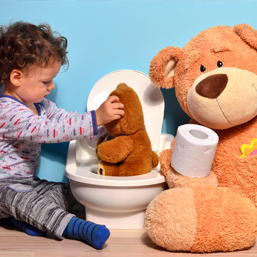
There is one milestone in a child’s life that can make a parent cringe like no other when it comes to starting the process. You guessed it – potty training. There are so many fears, anxieties and questions surrounding this complex milestone: “How long is this going to take?” “Will my child resist?” “Is my support network going to be on board?” “Where do I start?” Oh, and let’s not forget - the accidents. The messy, messy accidents.
After over a decade of potty training, we’ve tested all of the methods – from time prompts to overcorrection, to potty treats, to reward charts. No matter what the method, we’ve observed the same lingering myths about potty training that may impede the entire process if we feed into them:
Myth #1: Potty training should take no more than three days.
There are “miracle” guides out there that promise you that this milestone will be conquered within three days. If this has worked for you – amazing! However, this is truly rare. Based on our experience, these guides can sometimes create unrealistic expectations for caregivers during this process.
Mastery of this skill depends on your child’s signs of readiness, your own readiness to conquer the anxiety around this milestone, how well you set up both the physical and emotional environment, how consistent you are with the process and how on board your support networks are. If you attempt and don’t succeed within this three-day timeframe, it might exacerbate the anxiety when you’re ready to try it again. So let go of this expectation, and ride this beautiful (and messy) wave, no matter how long it takes.
Myth #2: Your child is always ready to potty train by 18 months.
It’s possible that we can start seeing signs this early, but it’s rare that we see mastery of this milestone at this age. Potty training is actually a very complex milestone.
Every area of development is taken into account when observing your child’s signs of readiness: Language and communication (they can verbally indicate that they have eliminated or need to eliminate and can receptively understand at least two-step instructions); gross motor and fine motor (they can pull their pants up and down independently); physical (they have bladder control for at least 90 minutes to two hours between eliminations); and cognitive (they understand the order and concept of routine).
Follow your child’s signs of readiness and not an unrealistic standard that others pressure you into. The repercussions of starting too early could again create anxiety around the process in the future.
Myth #3: All you need to do is catch the eliminations and you’ll master potty training in no time!
Catching eliminations is a big part of making the process successful, but it is by no means the “be all, end all”. There’s a lot that should go into potty training proactively that we often overlook.
The biggest part is actually setting up the physical and emotional stages. The physical includes: purchasing the right materials, figuring out where and how to place them, and creating an enticing environment. The emotional includes: practicing use of appropriate language, prepping yourself to reduce your own triggers and anxiety, paying attention to your child’s “potty cues”, setting up a new routine, and prepping your child with the brand new expectations. It may sound like a lot of work, but once you set the stage, it definitely gets easier!
Myth #4: Find a good potty treat and reward chart, and you’ll be fine.
Our biggest motto is “you know your child best”. You’re going to do what works for you and your child. A reward chart may be your “golden ticket”.
However, we strongly recommend trying social praise first for eliminations in the form of dance parties, bubble parties, silly hat parties – all of the parties! This helps build that intrinsic motivation instead of relying on stickers or potty treats. Treats and prizes can be tricky to fade out and could turn into a negotiation battle quite easily.
We hope that debunking some of these myths helps you become more equipped in starting the potty training journey with your own kiddo! Visit psychedaboutkids.com for more tips and advice. Good luck!
Joanna and Lara (Registered Psychologist and Child Mental Health Advocate) started Psyched About Kids (PAK) in 2016 because they are obsessed with human potential! PAK empowers parents with science-backed knowledge, strategies, and tools to solve our most pressing parenting issues today and make life a little easier, along with ongoing support to implement the desired change. Small actions over time can have an unimaginable impact on child growth and development for lifelong health and wellness. Learn more at psychedaboutkids.com.
See our related articles:
Calgary’s Child Magazine © 2024 Calgary’s Child